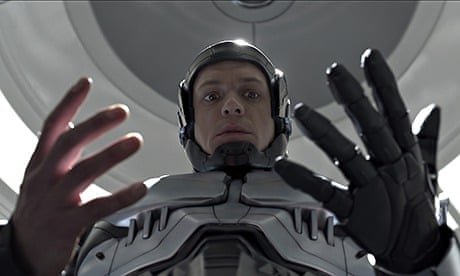As a kid, I heard of Detroit by watching RoboCop, which portrayed the city as a disaster area marked by rampant street crime and corporate exploitation. I knew it was a fantasy, a tongue-in-cheek exaggeration of Reagan-era social anxieties, but the associations lingered.
Now reality is catching up: Detroit recently declared bankruptcy, with a judge noting that it "no longer has the resources to provide its residents with basic police, fire and medical services". It's a desperate situation for the city's residents, but I thought it might at least lend the new remake of RoboCop the satirical urgency that Paul Verhoeven brought to his 1987 movie.
It is disappointing, then, to see that the Detroit in José Padilha's film is in considerably better nick than the real thing, let alone the one in Verhoeven's film – more bourgeois suburbia than urban dystopia. Disappointing, but not surprising. It's almost impossible to imagine Verhoeven being allowed to make his movie today.
With RoboCop, Total Recall (1990) and Starship Troopers (1997), Verhoeven established himself as the maestro of the subversive action blockbuster – perhaps the only Hollywood film-maker to successfully marry big-budget populism with stealthy but trenchant satire. These movies delivered spectacle and thrills but consistently targeted corporate greed, unbridled militarism and the perils of allowing escapism and propaganda to dominate public discourse. But they are now being remade more or less in the service of those very things.
First came 2012's reboot of Total Recall. Verhoeven's film was deliciously slippery: character, environment and narrative were hard to pin down from the off. Swept up in the action, we and our hero, Douglas Quaid (Arnold Schwarzenegger), lost track of the overwhelming likelihood that the whole thing was, in fact, hooey. Yet Len Wiseman's remake fudged all this, ramped up the chick-on-chick violence and swapped Martian mutants for off-the-shelf robots.
Verhoeven's RoboCop brought a hardwired Christ figure to a society geared around corporate profit. And it had ED-209, that crazy, feral killer droid! Padilha's remake does focus on corporate villainy and has a shrewd, funny Tehran-set prologue, plus some heavy-handed media spoofery. But it lets the big targets off the hook by finding a hero within the corporate machine and making the lead's prime concern the integrity of his family life. What a RoboCop-out!
Starship Troopers was arguably Verhoeven's masterpiece, ostensibly a rightwing propaganda epic that dared audiences to disengage with its outrageous politics or just, you know, enjoy the giant bugs. It was a highly irreverent adaptation of the problematic novel by Robert Heinlein but an upcoming reboot will, according to one of its writers on Twitter, be "an actual adaptation of the Heinlein novel. An Officer and a Gentleman in power armor". Gross.
It wasn't just the satire that made Verhoeven's movies such gems. They were witty and mischievous, with strong, clear storytelling, quirky production design and a vivid sense of the grotesque. They had giant, quivering grubs, nuclear-war-themed family board-games and Arnie dressed as a middle-aged woman in a fierce raincoat.
So far, their remakes offer little like that. Their scripts are po-faced and messy; they look like every other shimmery, machine-tooled SF action picture out there; and instead of engaging playfully yet seriously with the structural forces determining contemporary life, they offer straight-up sentimental heroism.
In other words, they're in keeping with a studio blockbuster culture that celebrates turbo-charged techno-militarism and cashes in on audiences' familiarity with established entertainment brands. Transformers and Avengers, I'm looking at you. By contrast, Verhoeven was an original and a provocateur. He wanted to make audiences squirm – to alienate them from the spectacle of fetishised violence even as he slathered it on. Good luck getting that greenlit today.
The new RoboCop movie is, in part, about bad guys trying to remove the soul of their corporate property to make it a more reliable cash cow. I doubt it's deliberate but that part, at least, feels like satire.

Comments (…)
Sign in or create your Guardian account to join the discussion